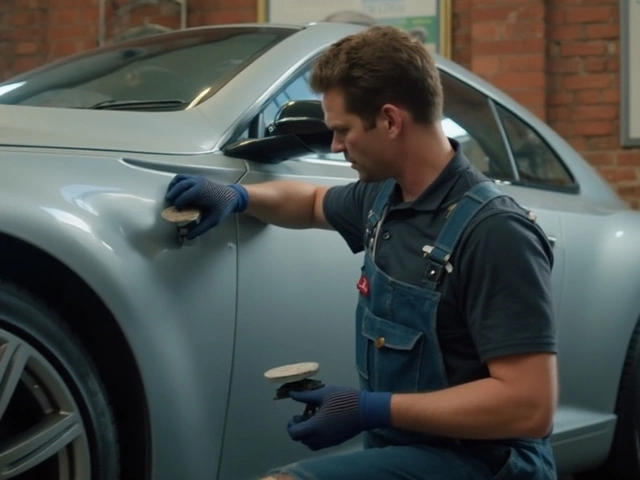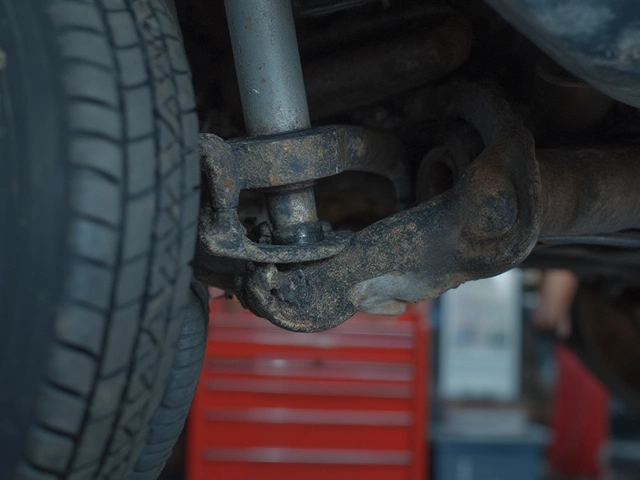Ever been jolted out of your seat by a car's thunderous roar? It's probably the work of a well-tuned loud exhaust. So, what makes these exhausts howl louder than others? At the heart of it, it's about a mix of engineering and personal taste. Drivers who want to make a statement tend to gravitate towards these sonic beasts.
First things first, exhaust loudness isn't random. It's heavily influenced by design choices like the piping diameter, the material used, and even the way the exhaust is fitted. Bigger pipes often mean bigger sound. Then there's the material—titanium, for instance, is known to produce a sharper tone than stainless steel.
But why go loud at all? For some, it's the thrill of feeling their car's power resonating through the ground. For others, it's about being heard before being seen and, let's admit it, a healthy dose of vanity. Certain exhausts, like straight pipes or aftermarket systems, are famed for their head-turning rumbles. And let's not forget the sheer joy that comes with revving up and letting the world notice your ride.
- Understanding Exhaust Loudness
- Why Drivers Choose Loud Exhausts
- Top Contenders for the Loudest Exhaust Types
- Materials and Their Impact on Sound
- Legal Considerations of Loud Exhausts
- Tips for Choosing the Right Exhaust
Understanding Exhaust Loudness
The world of exhaust systems is fascinatingly loud. But why do some pipes holler more than others? It boils down to science and sound waves. At its core, an exhaust's loudness hinges on its ability to manage air flow and vibration from the engine. As the exhaust gases exit, they produce sound waves that we hear as that familiar rumble.
Key Factors Influencing Loudness
There are several key factors that determine how loud an exhaust can get:
- Piping Diameter: The general rule of thumb is the bigger the pipe, the more air it can push through, thus increasing the noise level. Larger diameters give sound waves more room to resonate.
- Material: Different materials resonate differently. Titanium exhausts, for example, tend to have a higher pitched sound compared to traditional stainless steel.
- Design: Straight pipe designs offer less obstruction, letting more sound escape while also boosting performance. Mufflers, on the other hand, are designed to reduce noise.
- Exhaust Tips: Flared tips can amplify the sound, acting like a megaphone for the exhaust notes.
Why Does This Matter?
You might wonder why drivers care about having the loudest exhaust. For many, it’s about the car exhaust types serving as a personal expression. The roar of an engine can feel empowering. Plus, there's a practical side too; sometimes, a loud sound can alert other drivers, improving road safety.
| Exhaust Type | Average dB Level |
|---|---|
| Stock Exhaust | 50-60 dB |
| Performance Exhaust | 70-90 dB |
| Straight Pipe | 100 dB+ (watch out for noise laws!) |
Remember, every design choice impacts the auditory experience. Whether you're just curious or a driver planning to tweak your ride, understanding these factors ensures you get the right sound for your style.
Why Drivers Choose Loud Exhausts
So, you're curious about why some folks just can't get enough noise from their cars? Well, it turns out there are some interesting reasons behind this craze for loud exhaust systems.
Embracing the Thrill
First up, there's the sheer thrill factor. For many, a loud car exhaust isn't just a sound; it's an experience. Imagine firing up the engine and hearing that powerful growl. It's like an adrenaline rush for some drivers, akin to the roar of a lion marking its territory.
Making a Statement
Then there's the desire to make a personal statement. Think of it like fashion but for vehicles. A loud exhaust can make your car stand out, leaving a lasting impression. For those who see their ride as an extension of themselves, the sound becomes part of their identity.
Performance and Efficiency
Believe it or not, some drivers opt for noisy exhausts for performance improvements. Modified exhausts can actually help in boosting an engine's efficiency by enhancing the outflow of exhaust gases, which in turn can slightly increase horsepower. Although the impact might not be huge, it's an attractive perk for driving enthusiasts.
Community and Culture
It's worth noting that the loud exhaust scene isn't just about cars; it's a subculture of its own. Car meetups often spotlight vehicles with unique or custom exhaust sounds. It's a way of connecting and sharing techniques, setups, and stories that unite a community of enthusiasts.
Whatever the motivation, one thing's for sure: the allure of a loud exhaust goes beyond just noise. It's about feeling, identity, and belonging to a crew that's as captivated by the sound of roaring metal as you are.
Top Contenders for the Loudest Exhaust Types
When it comes to making a real auditory impact, certain exhaust systems lead the pack. These are the ones known for turning heads and possibly rattling windows as you roll by. Let's check out some of the loudest exhaust types that have earned their reputation in the noise arena.
1. Straight Pipe Exhausts
Straight pipes are the undisputed king when it comes to volume. They eliminate any mufflers or resonators, so it's just a direct route for the exhaust gases to escape. It's simple and effective but definitely not subtle. Expect some real noise, often hitting decibel levels that are not exactly street-friendly.
2. Cat-Back Systems
These systems start after the catalytic converter, thus the 'cat-back' name. They typically replace the stock mufflers and piping. Some cat-back systems are specifically designed to boost decibels, like those from brands like Borla or Flowmaster. They're a popular choice for enthusiasts who want a loud rumble with a bit more consideration for backpressure and performance.
3. Axel-Back Exhausts
An axel-back exhaust swap can really ramp up the sound without much hassle. It involves changing the exhaust components from the rear axle to the exhaust tips. Brands like MagnaFlow provide axel-back systems that can enhance sound considerably, turning a stock growl into something more ferocious.
4. Headers and High-Flow Cats
Don't underestimate the impact of a good set of headers and high-flow catalytic converters. These mods reduce restriction before the sound even reaches the exhaust system. This means more sound makes its way out, and possibly a bump in horsepower too.
| Exhaust Type | Estimated dB Level | Street Legality |
|---|---|---|
| Straight Pipe | 110-120 dB | No |
| Cat-Back | 90-100 dB | Yes, but varies |
| Axel-Back | 85-95 dB | Yes |
| High-Flow Headers | 95-105 dB | Varies |
In the quest for the loudest car exhaust types, it's crucial to weigh the joy of sound against local regulations. A high-decibel setup could lead to fines or worse, so staying informed is key. If you're thinking about making noise, consider balancing sound with sensibility. Your neighbors (and law enforcement) might thank you for it.

Materials and Their Impact on Sound
Ever wonder why some cars growl and others just purr? A lot comes down to the materials used in exhaust systems. It's not just about looks or durability—different materials actually shape the sound your car makes.
Titanium vs. Stainless Steel
Titanium exhausts are a popular choice for performance enthusiasts. This metal is super lightweight and has a resonant quality that gives the exhaust note a sharp, aggressive sound. It's like going from a whisper to a shout. Plus, titanium's ability to withstand high temperatures without losing integrity means the noise remains clear and undistorted over time.
Stainless steel, on the other hand, adds a deeper, more mellow tone. While it doesn't have the same high-pitched zing as titanium, it's still a solid option—known for being durable and resistant to corrosion. It's like the dependable friend who's always there without making a fuss.
Aluminum and Mild Steel
Aluminum is the cost-effective joker in the pack. It's light and easy to work with but lacks the endurance of titanium or stainless steel, often leading to a more subdued sound over time as it wears. Mild steel is the heavyweight here—literally. Heavier than the others, it produces a baseline, no-nonsense sound. It's cheaper but more prone to rust, demanding some extra care to keep it in top shape.
Here's a quick comparison of these materials:
| Material | Sound Quality | Durability |
|---|---|---|
| Titanium | Sharp, aggressive | High |
| Stainless Steel | Deep, mellow | High |
| Aluminum | Initial sharp, can dull | Moderate |
| Mild Steel | Baseline, no-nonsense | Low |
So, how do you pick the right one for your car? It all depends on what you’re after. Want to turn heads with a piercing roar? Go for titanium. Prefer a subtle hum that doesn’t sacrifice durability? Stainless steel’s your best bet. Whatever you choose, remember that the material will have the final say on your car's auditory signature.
Legal Considerations of Loud Exhausts
Owning a car with a loud exhaust isn't just about the thrill of noise; there are legal bits to consider. Depending on where you live, those mighty roars can land you in hot water, legally speaking. So, what's the deal?
Let's start with the basics. Most places have noise limits set by the local or state government. These are measured in decibels (dB), and exceeding them can result in fines. For instance, in California, any exhaust noise over 95 dB is technically against the law unless it's running through an exemption or part of a racing vehicle used in official events.
Why the Noise Laws?
Loud exhausts can be harmful to public health and disturb the peace. The limits aim to balance between the joy of car enthusiasts and the peace of a quiet street. It's a tough line to walk, but the rules are there for a reason.
Getting Caught: Consequences
If you find yourself crossing the legal noise threshold, expect more than just dirty looks from neighbors. Fines can range from $100 to $500 or more. Plus, multiple offenses might lead to getting your vehicle pulled off the road until you fix the issue.
Staying Safe and Sound
- Consider getting a noise test done at a local garage to ensure you comply with regulations.
- Some exhausts come with adjustable features that allow you to control the sound level manually.
- Check with local car clubs or forums for tips on compliant car exhaust types.
Staying within the legal limits is key, not just to avoid fines but to respect your community. Remember, it's great to express your passion, but not at the expense of peace.
Tips for Choosing the Right Exhaust
Picking out an exhaust system can be a bit daunting with so many options out there. But if you're looking to up your car's sound game, here’s a solid guide to lead you down the right path.
Consider Your Driving Needs
First, think about what you really need out of your exhaust. Are you after pure loudness, or do you want a balance of sound and performance? Daily drivers might not need the head-splitting noise of race cars, while weekend racers might crave it.
Do Your Homework on Materials
Not all exhausts are made the same. Materials like stainless steel and titanium affect both durability and acoustics. Titanium is lightweight and delivers a crisper sound, while stainless steel is more robust and budget-friendly.
Size Matters
Pay attention to pipe diameter. Generally, larger diameters mean more sound and flow. However, too large a system may lead to loss of back pressure, which can reduce performance—a big no-no for those looking to get the most out of their ride.
Check the Law
Before splurging on an aftermarket exhaust, ensure you know what’s street legal in your area. Laws on noise levels can be quite strict, and no one enjoys a hefty fine or a failed inspection.
Seek the Expert's Input
Once you’ve got a rough idea, it’s a good time to chat with a pro—either online communities or a trusted mechanic. They can give you insights you never considered, possibly steering you towards a better decision.
Budget Accordingly
Your wallet will ultimately decide. Set a budget and try to stick with it. Remember, expensive doesn’t always mean better. There are plenty of affordable systems that offer a great roar and solid performance.
Installation
Before sealing the deal, consider installation costs. Some car exhaust types are easier to fit yourself, while others might require professional help. Factor this into your budget to avoid any surprises.
Choosing the right exhaust isn't just about decibels. It's about picking what fits your lifestyle, your legal boundaries, and your wallet. Keep these tips in mind, and you’ll be riding with the perfect sound tailing your car in no time!






